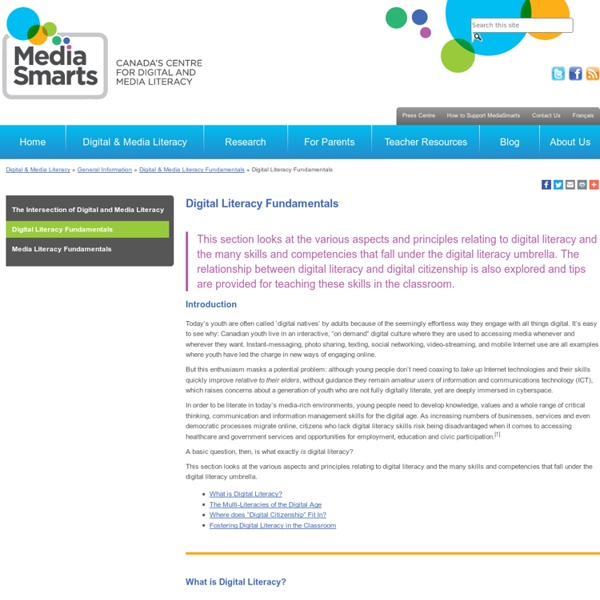Digital Literacy Fundamentals

Digital Literacy Definition and Resources
What is Digital Literacy? The ability to use digital technology, communication tools or networks to locate, evaluate, use and create information. 1The ability to understand and use information in multiple formats from a wide range of sources when it is presented via computers. 2 A person’s ability to perform tasks effectively in a digital environment... Literacy includes the ability to read and interpret media, to reproduce data and images through digital manipulation, and to evaluate and apply new knowledge gained from digital environments. 3 What is a Digital Learning Librarian? The Digital Learning Librarian at the University of Illinois works collaboratively with librarians and faculty to create tools that help to integrate the library into the teaching and learning process. One result is the creation of online resources that focus on infusing library and information skills with instructional technology to help individuals obtain digital literacy. @ Other Institutions... Resources
Digital Literacy
7 Reasons Why Digital Literacy is Important for Teachers - Blog | USC Rossier Online
Herramientas y plantillas para infografías
Moderna forma ondulada de color azul 276,356 1018 hace 8 meses Pinceladas negras de acuarela con plantilla de texto 75,563 621 hace 3 meses Colección de efectos de luz 239,884 1407 hace 9 meses Colección de elementos de diseño para hacer crestas 17,657 237 hace 4 semanas Nuevo Plantilla modera infográfica de negocios 702 16 hace 2 semanas Infografía con pasos plana con iconos divertidos 1,062 20 hace 3 semanas Mapa punteros 27,641 130 hace 1 años Elementos infográficos de banners corporativos 936 14 hace 2 semanas Pinceladas coloridas de acuarela 40,909 381 hace 2 meses Colección de elementos de diseño para hacer cresta 16,232 176 hace 4 semanas Concepto de inicio y desarrollo. elementos de diseño planos. vector 10 0 hace 3 días Fondo ondulado azul y verde 108,718 467 hace 6 meses Salpicaduras de agua azul con las ondulaciones aislados en el fondo transparente 104,098 931 hace 7 meses Conjunto colorido de diseños de acuarela 29,344 269 hace 3 meses
What Is Digital Literacy?
Ava reads at Indian Run Elementary School in Dublin, Ohio. The school integrates iPads, laptops, and books into reading time. —Maddie McGarvey for Education Week Digital Literacy: An Evolving Definition While the word "literacy" alone generally refers to reading and writing skills, when you tack on the word "digital" before it, the term encompasses much, much more. Sure, reading and writing are still very much at the heart of digital literacy. The term is so broad that some experts even stay away from it, preferring to speak more specifically about particular skills at the intersection of technology and literacy. The American Library Association's digital-literacy task force offers this definition: "Digital literacy is the ability to use information and communication technologies to find, evaluate, create, and communicate information, requiring both cognitive and technical skills." Finding and Consuming In some formats, "consuming" digital content looks pretty much the same as reading print.
Inicio - Fundación Carlos Slim | Fundación Carlos Slim
Digital Literacy | Communication Learning | Media Education | Skills Communication
PIEENSO
Related:
Related:



